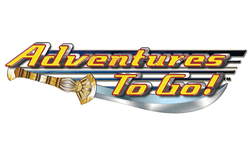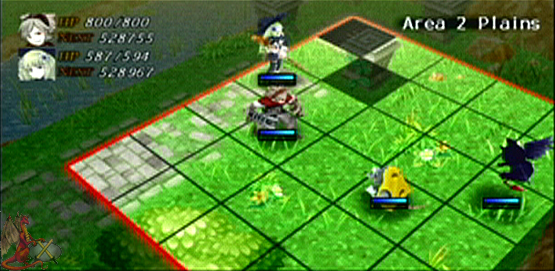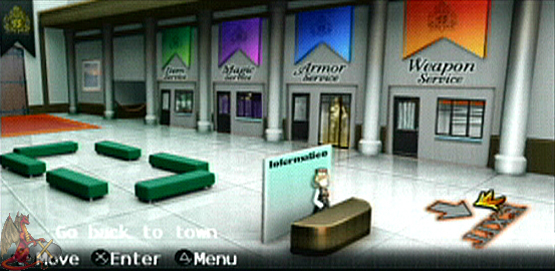|
|

|
PLATFORM
|
PSP
|
BATTLE SYSTEM
|

|
INTERACTION
|

|
ORIGINALITY
|

|
STORY
|

|
MUSIC & SOUND
|

|
VISUALS
|

|
CHALLENGE
|
Very Easy
|
COMPLETION TIME
|
40-60 Hours
|
|
OVERALL

|
+ Hilarious, witty dialogue
+ Easy to play
+ Tailored to play on-the-go
- Story disjointed
- Lack of options
- Tactical elements missing
|
Click here for scoring definitions
|
|
|
Finn is a boisterous young man looking to make a fast piece of gold, but normal work doesn't interest him. It's time for Adventures To Go! to step in and provide a necessary service for the community. While the game suffers from a number of flaws that will turn off most gamers who might be interested in the title, there are two potential audiences that may wish to investigate: those who have never played a Tactical RPG before but do not want to leap into a difficult game such as Fire Emblem, and those hardcore TRPG fans who cannot get enough of the genre. Though the game has a lot of potential, its good aspects do not outweigh the lacklustre parts, leaving the player with a game that is slightly below average and seeking a niche within a niche.
One thing AtG excels at is being approachable. With a few exceptions, most dungeons can be completed in 30 minutes or less. Forget what the next task was? Check the quests menu. Not sure how to create a map? The Professor can help. The Office will have non-storyline quest items to gather for fun and profit. With that out of the way, hustle the party over to the Adventures To Go training centre, because it's time to make some gold! Step up to the counter and order an adventure tailored to any need. The player will need to choose a type of terrain and a monster family for every level they intend to visit. Further options unlock as the game continues, until the player can fill nine floors in total: four regular terrains, and five underground levels. Each chapter requires a unique combination of terrain and monsters to fulfil whatever harebrained scheme Finn and his friends are caught up in. The better the terrain and monsters, the better the drops and gold earned -- but it also costs more to set up this sort of dungeon. On top of this dungeon cost, better equipment and magic is required to overcome the challenges ahead.
Once inside, there are a variety of monuments that a player can interact with. Explore Monster Houses and push triggers to unlock treasure chests. Delving into a dungeon doesn't take any sort of talent, but planning ahead is wise. Out of cash and can't get back into the advanced terrain? Press the button to reset all the quests outside the main storyline and fetch all the previously acquired items again. For those who don't bring enough healing or magic, simply find the nearest return switch and exit the dungeon before completing it. However, by doing so the end of level reward is forfeited. It may be wiser simply to run away from any combat, as escaping from battle is a guaranteed move. At the end of the day the party goes to sleep, restoring it to full health and replenishing all spell charges.
 Devil Mice Ahead
Devil Mice Ahead
|
|
Combat itself is easy to grasp and simple to manage. There's no visible turn order, so it's a guessing game whose action will be next. Each character gains Action Points, or AP for short, at the start of their turn. This number is determined by the speed statistic; Finn starts out with just six AP per turn, but at later levels it isn't unusual for him or another party member to gain twelve to fourteen at the start of each round. AP are used for everything: moving, attacking, defending, using items, and magic. Movement, which includes turning to face a new direction, is one point. Attacking and defending takes two points; this is important to remember, because defending at the end of every turn when facing bosses will minimize the damage taken. Spells take anywhere from two to ten AP each, depending on the type of magic. One thing the game lacks, and it leaves a large gaping hole in combat, is any form of melee abilities. With four party members and only one focused on spell casting, this is a telling omission in the game. It means the majority of battles are simply the player pressing the X button over and over, which is a little boring.
The magic system is fully fleshed out but poorly explained in-game. Each character can hold a variety of spells -- but how many each can hold is never explained, and characters cannot ever increase the variety of spells they can hold. For example, when Jack joins the team he can equip two different spells with up to nine charges of both. Each spell is comprised of two to four magical shards -- a simple spell may be Fire plus Blade, while a more complicated Heal All spell is three Love with one Life shard added in. Order matters (Life then three Love have no effect), but many magics have more than one source combination -- Earth/Blade/Blade works as well as Earth/Earth/Blade. Much like dungeon variety, not all shards are available at the start of the game, but as the story progresses advanced varieties become available, allowing the player to cast important spells that manipulate the party and enemy AP. The combat system has a decent base, but it lacks several key necessary factors for a solid TRPG experience.
What music is in the game isn't bad, but it suffers from a severe dearth of variety. While this isn't an issue when playing one dungeon at a time, extended play periods may leave the player turning down the volume or reaching for the mute button after listening to the same battle, field, and boss music hour after hour. Conversely, the visuals are both detailed and throw out a good sampling of variety. While there's only a dozen or so creature models with two to four palette swaps each, every boss is unique and detailed. There's also an extensive variety of weapons which show a surprising amount of care and detail. Backgrounds and spell effects look good and the character artwork during story scenes is nothing to sneeze at. Overall while AtG isn't pushing any boundaries, this is one of the few areas in which the game is solid.
To say AtG is easy is the understatement of the year. The difficulty, as with many of the features and functions, is aimed at the player who thus far hasn't dabbled in TRPGs much, or is playing on a limited time budget and needs to get through the dungeons quickly. The only really challenging part of the game is eliminating large groups of enemies with a minimum of fuss. While boss battles start out challenging with one to two party members, they quickly become long exercises in defending at the end of each of the four characters' turns and tossing out the occasional haste, slow, and heal while chipping slowly away at the boss' HP. One boss mid-game is so easy, a player won't even need to heal before finishing him off; conversely, a boss closer to the end of the game can only be defeated if he does not use one of his abilities, something that's sheer luck. This inconsistency can be a little frustrating. Also seemingly inconsistent is the completion time of the game. While clearly developed and modelled around playing in small bursts (one to two dungeons per session), the game is quite long; fast tracking will probably get it done in about thirty hours, not including content that only unlocks after the main story is complete, but a typical run will take fourty to fifty hours.
 AtG's Lobby
AtG's Lobby
|
|
The interface, like so many things in AtG, is fine on the surface but suffers from a lack of depth. While any information can be accessed within a maximum of two menus, once there the information a player is seeking isn't always available. For example, when selling equipment only the effect of the gear, not the stats and element resistance, is visible -- and the extra effects a gear has are not nearly as important as its stats and resistances. The same lack of visible information dogs the magic creation screens, in that the player cannot view what a spell does while viewing the needed crystals. Even worse, backing out of this screen takes the player to the start of the magic list, meaning they will need to page back over to whatever spell was being perused. Not overwhelming the player with information is good for the inexperienced, but this is key material that should all be available on one screen. Conversely, the localization seems to have been completed with a great deal of care. There's no spelling or other errors to be spotted, the dialogue is fleshed out without any incomprehensible bits, and overall this aspect feels quite polished.
Said dialogue is funny and witty, making the story scenes hilarious and entertaining to watch -- an excellent interlude between the dungeon forays. That being said, the overarching story isn't solid; it's like watching a television show where only every other episode is being played. The individual chapters are great, but the overall flow is a little stilted. To make matters worse, the story pacing is also all over the place. The game feels like it is wrapping up about a dozen chapters before the antagonist is introduced (and his role is downplayed considerably to start). A second lull happens about two-thirds through the story, but again this is not the ending. These are not "false endings" as are seen in some other games, just ill-placed winding down segments. The originality also suffers from this up and down treachery as the idea of building dungeons is fine, but an overabundance of generic monsters is not.
In the end, AtG is not for most people. With so many solid titles being released around the same time, it may not even be for many people. However, for those looking to break into the genre and the TRPG fans who can't get enough, as well as those looking for a game that isn't the standard "save the world, win the girl" story will likely find a breath of fresh air in store here. If a player approaches the title not looking for game of the year material but instead seeking something to be played in bite-size portions on the go, then it may be in that person's interest to seek a purchase. It's sad to see a game whose concept has a lot of potential but doesn't follow through with a better presentation.
Review Archives
|









